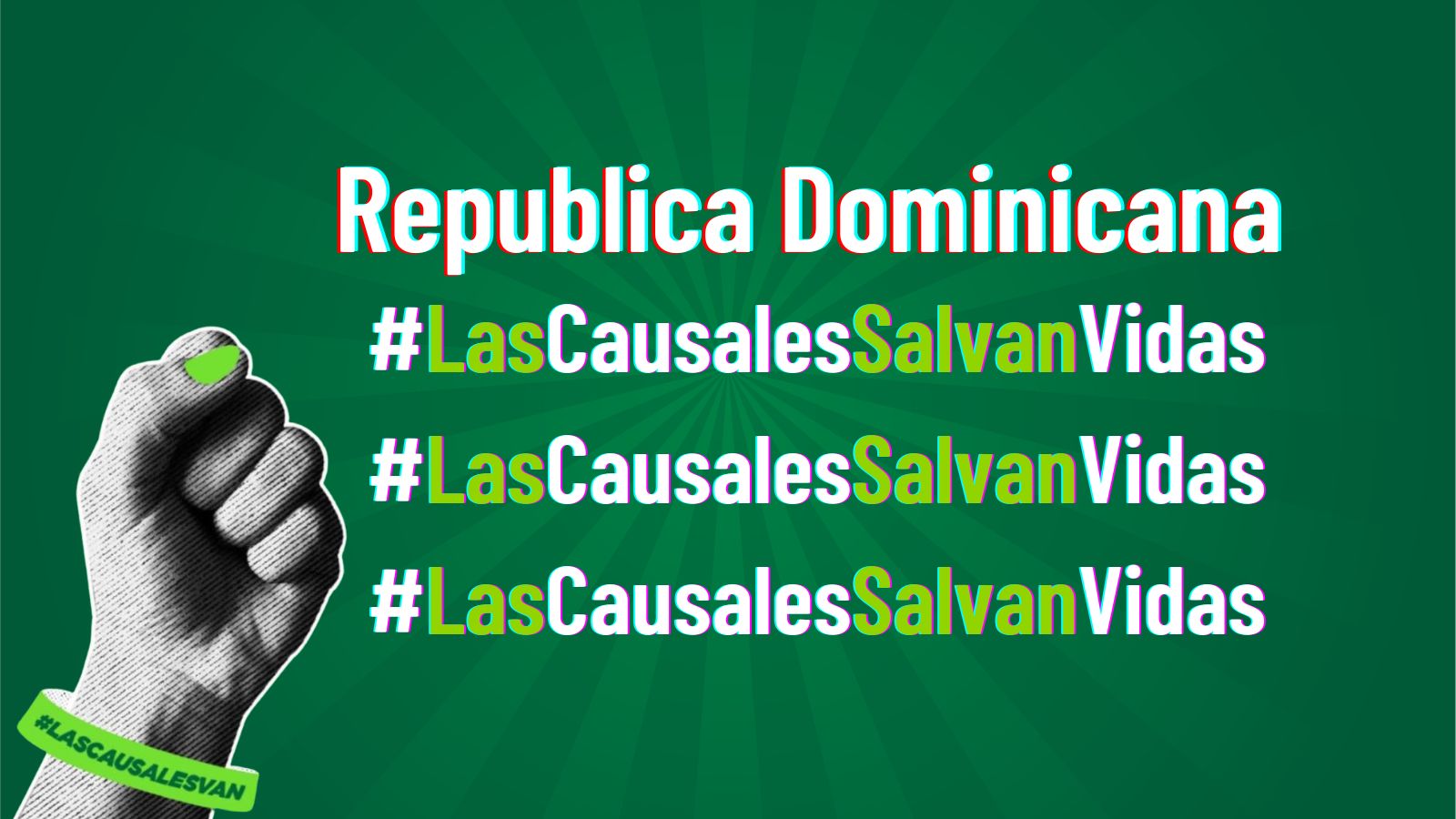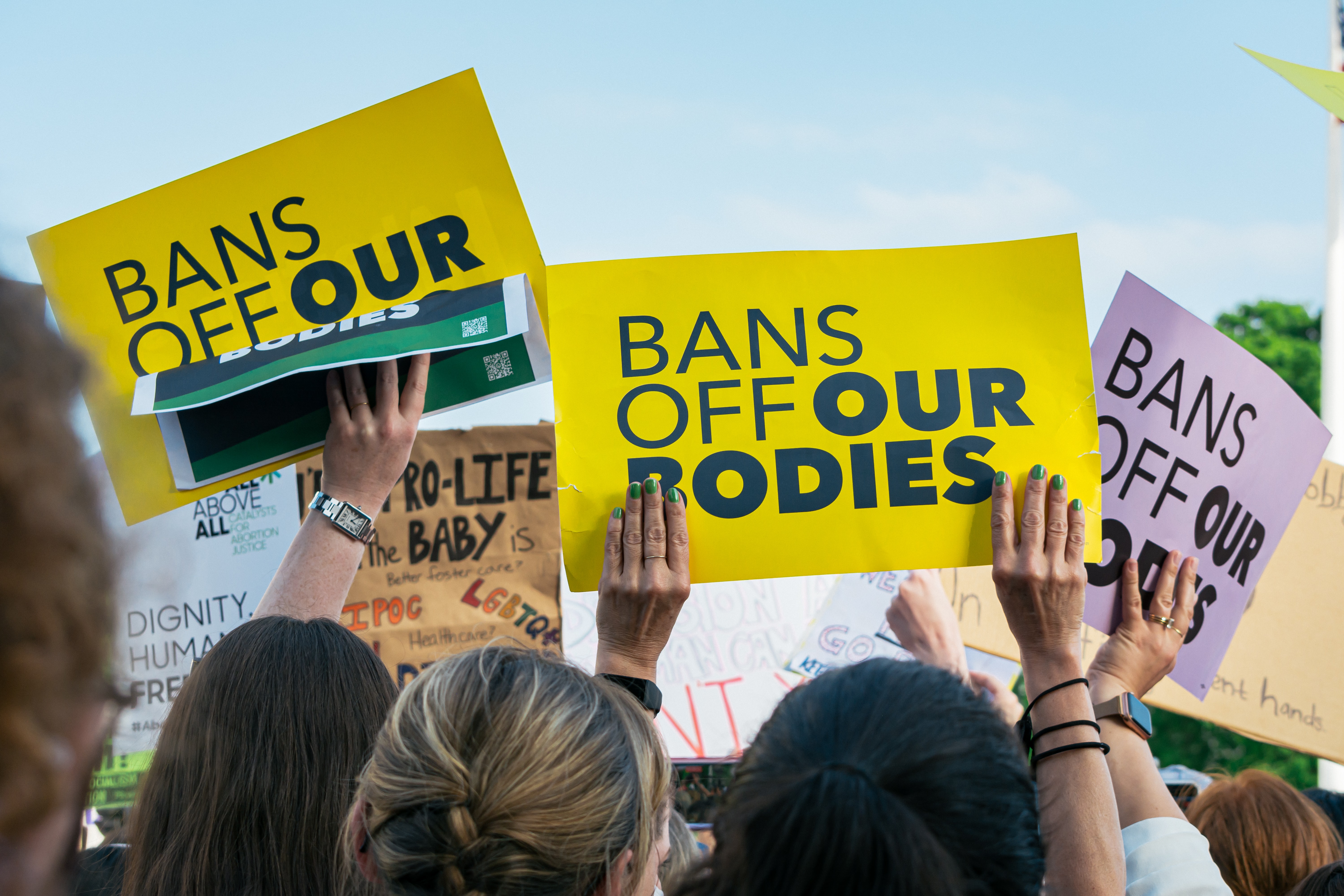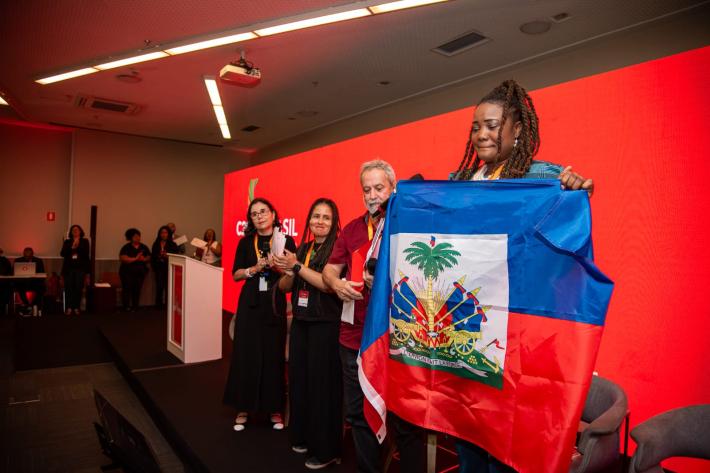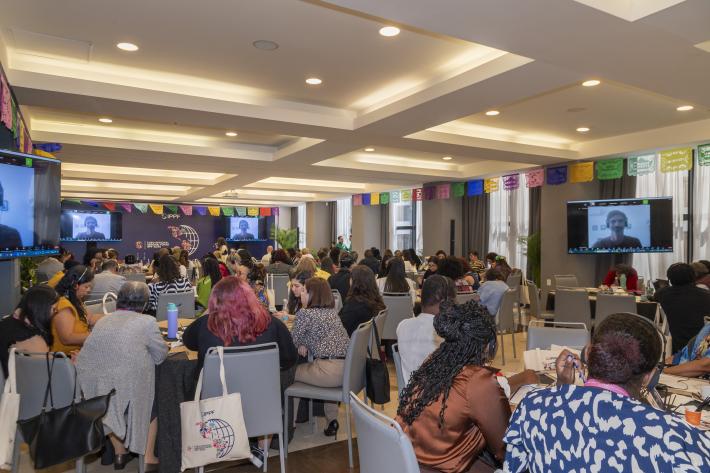Latest press releases
A selection of stories from across the Federation
Americas & the Caribbean
Breaking: IPPF Global Research Exposes Devastating Impact of the Trump Administration
Over Half of Partners and $85 Million Affected
For media enquiries


| 22 December 2023
IPPF's Impact on Sexual and Reproductive Health and Rights in 2023 in the Americas and the Caribbean
Forging Change, Weaving Connections: IPPF's Impact on Sexual and Reproductive Health and Rights in 2023 in the Americas and the Caribbean As the year 2023 draws to a close, we at IPPF express our sincere gratitude for your unwavering work that has been instrumental in advancing sexual and reproductive health and rights throughout the Americas and the Caribbean. As we reflect on the year, we celebrate our collective achievements in pursuit of a more inclusive, accessible, rights-based and people-centered landscape. It has been an honor to walk together, and we highlight some key initiatives in communities in 30 countries across the region. After our regional meeting in Panama, we look forward to further strengthening our partnerships and continuing to weave together lasting actions to create meaningful change in our region, learning from each other's experiences and expertise. Looking ahead, we look forward to continuing this important work in 2024 with even more strength and exchange - together, let's shape a future in which sexual and reproductive rights are accessible to all people! Expanding Access to Sexual and Reproductive Health and Rights We are present in 26 countries in the Americas and the Caribbean, advocating and providing sexual and reproductive health information and services. We provided more than 18,545,339 sexual and reproductive health services throughout the Americas and the Caribbean. Of these, 36% were provided to young people under the age of 25. In 2023, we welcomed 5 new Collaborating Partners: in Argentina, Guatemala, Guyana, Haiti and Venezuela, and a new Member Association in Chile. With Member Associations and Collaborating Partners, we developed a work plan to guide our priorities as a region. We worked with Women Living with HIV to improve health services to address their sexual and reproductive health needs and ensure their free and safe motherhood. Together with our membership and strategic partners, we launched the Caribbean Observatory on Sexual and Reproductive Health and Rights in Trinidad and Tobago in December to strengthen evidence-based advocacy. We connected advocacy at the regional and global levels to build collective responses. Together with Amnistía Internacional, Red por la Salud de las Mujeres Latinoamericanas y del Caribe (RSMLAC), Redlactrans, Redtrasex, Synergistic - Iniciativa por los Derechos Humanos and Vecinas Feministas por la Justicia Sexual y Reproductiva en América Latina, we launched the regional alliance for human rights and promoted the inclusion of sex workers. We created and strengthened alliances with collectives and organizations in the Caribbean such as Feminitt Caribbean, Caribbean Vulnerable Populations Coalition and ECADE to advance the rights of LGBTIQ+ people and youth. We strengthened alliances with ILGA World and AWID to discuss trans and feminist solidarity. We articulated with organizations and agencies such as UNAIDS, ECLAC, UNFPA, UN Women and EPF to continue positioning the sexual and reproductive health and rights agenda. Together with Member Associations and Collaborating Partners, we issue recommendations for decision makers on key issues such as early unions, sex work, abortion and youth. Acting with Youth at the Center IPPF's new regional youth network held its first meeting to strategize and elect its steering committee. We increased the presence of youth on the IPPF ACRO team to better serve their needs. The IPPF Youth Network participated in the 10th Anniversary of the Montevideo Consensus and in the Board Meeting of the Regional Conference on Population and Development. We are stronger in social networks and the media. We expanded the dissemination of strategic messages on our priority issues in the region. We positioned ourselves as leaders in DSDR in media outlets such as Subele a la Radio, Pressenza, El Soberano.org, La tercera and El Observador Mundial, among others. We reach more than 15k people around the region with greater incidence in Peru, Mexico, Barbados, Guyana, Suriname, Colombia, Trinidad and Tobago, Argentina, Aruba and the United States.

| 16 October 2023
IPPF ACRO express concern over guidance of the Zambian Ministry of Health who advised against the use of the term “sexual and reproductive health and rights”.
At a time of profound and multiple crises, it is worrying that the focus of any government's action is to go back on already consolidated international commitments, particularly those which recognize, based on evidence, that Sexual and reproductive health and rights (SRHR) are fundamental human rights, central to eradicating poverty and achieving sustainable development across its social, economic, and environmental dimensions. SRHR – which encompasses a range of issues, including universal access to SRH services and supplies, comprehensive sexuality education, and ending gender-based violence and harmful practices such as early, child and forced marriage – are fundamental to the ability of all people, especially women, adolescent girls and young people, to lead full, satisfying, healthy and productive lives. SRH services are a critical aspect of SRHR, but a complete understanding of sexual and reproductive health and rights goes far beyond on access to health facilities and services to include an array of social, legal, institutional, and financial arrangements that enable individuals to exercise their rights in general and addresses the underlying social determinants. In this regard, our Latin American community urges the government of Zambia to review its position and, on the contrary, to improve and expand the SRHR services, including increasing funding in this sector, for example by investing in fulfilling the human rights of women and girls, in all their diversity, as gender discrimination is one of the leading determinants of poor health and unwanted SRHR outcomes. It is also key to addressing inequities in access due to poverty and multiple forms of discrimination, stigma and social and economic exclusion affecting various population groups. We conclude by highlighting the importance of evidence-based policies and, in 2023, the data indicates that effective policies are not those based on stigma and discrimination or elimination of rights. On the contrary, effective policies are those that include, care for, and treat all people as subjects of rights, capable of making decisions about their health and reproductive life, with the support of a State committed to promoting citizenship and the human dignity of their people. Here, at IPPF ACRO, we will remain attentive and always willing to contribute so that rights do not go backwards and no one is left behind. In solidarity, Eugenia Lopez Uribe Regional Director for the Americas and the Caribbean

| 06 June 2023
Launch of the Alliance for Sex Workers Rights
The Alliance for Human Rights and the Inclusion of Sex Workers in Latin America and the Caribbean demands an end to the criminalization of people who perform sex work and urges states to protect their human rights. This Alliance seeks to visibilize sex workers, who are invisible in the eyes of the States, leaving them in with total lack of protection and in violation of their rights. People who engage in sex work, mainly cis and trans women, are exposed to suffering a whole series of abuses against their Human Rights, such as sexual and physical violence, extortion, and discrimination, as well as torture and murder. We understand that in a world that is in full deconstruction of paradigms anchored in patriarchy, it is urgent to guarantee the rights of a sector that determines itself and exercises the right to make autonomous decisions about their lives and their bodies. Sex workers do so of their own free will, are of legal age and understand this task to generate their income. Criminalizing adult, voluntary and consensual sexual relations - including the exchange of sexual services - is incompatible with the Human Rights to personal autonomy, dignity, and privacy, among others, while denying the capacity to act to a determined group of women does not only is it absolutely patriarchal, but it is also opposed to all conventions that purport to reinforce the right of women to give or withhold their consent. This Alliance fights to end the exploitative conditions to which people who do not have the protection of the State are subjected due to anachronistic legislation, without considering the voice of the protagonists and strongly condemns human trafficking and forced labor. We seek to guarantee public policies and legislation that protect the Human Rights of people who perform sex work and combat the crimes and abuses that today are carried out against thousands of them. Our organizations are leading civil society networks and Human Rights organizations. We have decades of experience and knowledge in Human Rights, sexual and reproductive health and rights, HIV, harm reduction, the rights of LGBTIQ+ people, digital rights, the fight against human trafficking, migration and racial justice, among other topics. Within these numerous fields of expertise, organizations have come to the same conclusion: Criminalization is not the solution. Only by adopting a human rights-based approach, decriminalizing all aspects of sex work, and meaningfully and genuinely including sex workers and human rights defenders in decision-making can they be protected. The criminalization of consensual and paid sexual relations between adults continues to have a negative impact on the lives of sex workers and, in particular, on their access to health and justice. Despite calls by some organizations to abolish prostitution; to protect and rescue; people who sell sexual services, there is no evidence that criminalizing sex workers, their clients or third parties has a positive impact on the life or human rights of sex workers. To the contrary, decades of evidence from academic research, civil society organizations, and from sex workers themselves clearly indicate that policing, repressions, and criminalization directly harm health, well-being, and social inclusion. It is important to highlight the process that has been taking place in New Zealand since 2003, where there is evidence that shows substantial changes in the lives of sex workers after the decriminalization of sex work. This State made extensive calls and discussed public policies with the premise of cessation of the violation of rights, avoiding the generation of punitive regulations with a high moral charge that end up criminalizing people. Violence rates have dropped drastically.

| 15 February 2023
Statement on the Penal Code of The Dominican Republic
15 February 2023 For immediate release: Statement on the Penal Code of The Dominican Republic International Planned Parenthood Federation - Americas and The Caribbean Regional Office (IPPF ACRO) Two decades' worth of attempts by national feminist movements to reform the Dominican Republic's brutal Criminal Code has failed. The Caribbean country is one of the five countries in the world where ending a pregnancy is strictly prohibited under any circumstances. Abortion is now the third leading cause of maternal death in the country. The current Criminal Code dates back to 1884 and despite the Chamber of Deputies approving a revision to the Criminal Code in 2014 to allow abortion in the following three circumstances: where the pregnancy poses a risk to the life of a pregnant person, where the fetus could not survive outside the womb, and where the pregnancy is the result of rape or incest. The revision was struck down by the Constitutional Court in 2015. Despite President Luis Abinader vocal support of decriminalising support in certain circumstances, the decision today fails all pregnant people and will undoubtedly force more to turn to unsafe abortion methods that could be fatal. Eugenia Lopez Uribe – IPPF Americas and Caribbean Regional Director said: “ For twenty years the strong feminist movements in the Dominican Republic have fought to reform the barbaric Criminal Code that denies pregnant people access to safe and legal abortion. The Criminal Code is 140 years old, it did not serve the population then and it does not serve them now. IPPF will continue to stand side by side with the movement in the Dominican Republic to fight for reform, freedom and justice. All people must have the freedom to decide what happens to their body and that includes being able to end a pregnancy safely. Noone should have to die because of this Criminal Code that has caused so much harm and death.” IPPF - Americas and the Caribbean Regional Office stands in firm solidarity with the people of Dominican Republic and the feminist movements as we continue to fight for bodily autonomy, freedom, and reproductive justice. We acknowledge the enormous contribution of the Dominican leadership to the social justice movements in the region including the struggle for racial justice.

| 08 July 2022
Statement: Antigua and Barbuda to re-examine abortion laws
For immediate release: Antigua Planned Parenthood Association (APPA) / International Planned Parenthood Federation - Americas and The Caribbean Regional Office (IPPF ACRO) Statement on the government of Antigua and Barbuda re-examining abortion laws. As the government announces a re-examination of existing abortion laws in Antigua and Barbuda the Antigua Planned Parenthood Association (APPA) is pleased that policymakers have heard the call of millions of women worldwide in the wake of the detrimental ruling of Roe vs. Wade in the U.S.A. Access to abortion has been criminalized in Antigua and Barbuda since 1895, however, the government has acknowledged that the legal status has not prevented abortions with Chief of Staff in the Office of the Prime Minister, Lionel Hurst, commenting “We know that it is better to have it done by a doctor than the practice used by some of having non-professionals engaged in this system – because it can cause permanent damage”. The recognition that the current legislation has caused more harm than good, is certainly an encouraging first step toward the right to bodily autonomy for the women and girls in the country. “In our local context, the laws which criminalize abortion do not prevent the practice but certainly restrict access to safe and timely medical care. Decriminalizing abortion care would mean access to often life-saving care is a reality for women in Antigua and Barbuda.” - Lyndale Weaver-Greenaway, Executive Director at Antigua Planned Parenthood Association The mission of the Antigua Planned Parenthood Association (APPA), established in 1970, is “to advance the sexual and reproductive well-being of the Antiguan and Barbudan population by providing safe, efficient, and affordable sexual and reproductive health services including family planning” Dona Da Cosa Martinez, Deputy Regional Director of International Planned Parenthood Federation (IPPF) Americas and The Caribbean Regional Office commends the government's recognition of the need for re-examination of restrictive laws that do more harm than good for its citizens., “Antigua and Barbuda are now at the height of making the changes which are necessary to ensure the protection and fulfillment of the human rights of all its citizens to have full access to reproductive care, and in doing so, establishing a precedent for the rest of the Caribbean to follow. Now is the time for regional leaders to ensure free and full access to safe abortion care in all their countries.” The Antigua Planned Parenthood Association (APPA) is an Associate Member of the International Planned Parenthood Federation (IPPF), a movement of 120 autonomous members with a presence in over 146 countries. Member Associations provide non-profit family planning services, sexual health, and abuse prevention training and education. IPPF’s goals include giving clients the information necessary to make informed sexual health decisions, promoting continuous sexual health, and making high-quality sexual health services available.

| 24 June 2022
US Supreme Court overturns Roe v Wade in devastating blow to women's health and rights
The US Supreme Court has overturned Roe v. Wade in the biggest blow to women's health and rights in recent US history, removing 50 years of constitutional protection for abortion across America, meaning individual states will now decide the legality of abortion within their jurisdiction. Twenty-six states, including Mississippi, Oklahoma, Texas and Georgia, are now poised to enact "trigger laws" that will severely limit or ban abortion, putting approximately 40 million women and girls of reproductive age at risk of losing abortion access, with lower-income people and people of color most severely affected. The patchwork of state abortion bans means those without funds to travel for safe and legal abortion services or access medical abortion pills will be forced underground to unsafe and unregulated methods, with no guarantee of quality of care or aftercare if things go wrong. The devastating rollback of reproductive rights resulted from the Dobbs v. Jackson Women's Health Organization case, a 2018 ruling that banned abortion in Mississippi after 15 weeks of pregnancy. Of the nine federal Supreme Court Justices, six voted to uphold the Mississippi law, effectively overturning Roe v. Wade, and three dissented. Dr Alvaro Bermejo, Director-General of the International Planned Parenthood Federation, said: "The Supreme Court's decision to overturn Roe v. Wade is the biggest blow to women's health and rights in recent US history and an outrageous and devastating conclusion to what was already an unconstitutional removal of life-saving healthcare. "By continuing its unbridled attack on women's bodies and forcing them to carry pregnancies to term, the highest court in the land has reached its lowest point, robbing millions of their liberty, bodily autonomy and freedom – the very values the United States prides itself on. "We know for a fact that banning abortion does not mean fewer abortions and that when abortion bans are enacted, women and pregnant people die, as we have seen across the globe, most recently in Poland. We also know that those who cannot access safe abortion care legally, including medical abortion pills, will be forced into unregulated and unsafe methods, potentially resulting in serious harm or even death and costing lives for decades to come. "The fallout from this calculated decision will also reverberate worldwide, emboldening other anti-abortion, anti-woman and anti-gender movements and impacting other reproductive freedoms. The justices who put their personal beliefs ahead of American will, precedent and law will soon have blood on their hands, and we are devastated for the millions of people who will suffer from this cruel judgment." The overturning of Roe v. Wade also flies in the face of democracy and against the values of those the Supreme Court is meant to represent and protect, with the majority (60%) of Americans supporting Roe v. Wade and 70% believing the decision to end a pregnancy is between a woman or pregnant person and their doctor. Elizabeth Schlachter, Director of Advocacy and US representative for the International Planned Parenthood Federation, said: "The Supreme Court's perilous ruling is not just regressive but also wildly out of step with most Americans, who we know support access to abortion care. It is also at odds with much of the world, where access to abortion is expanding to reach all who need this vital health service. "By overriding the constitutional right to abortion across the US and handing the decision to each state, many parts of the US will now join El Salvador, Nicaragua, and Poland with some of the most restrictive, extremist, and life-threatening bans on abortion care in the world. "But this is not just about the anti-abortion movement in the US; this is concerted and calculated global effort by anti-women, anti-gender, anti-LGBTQI+ conservative and religious, white supremacist extremists, who are using dark money and undemocratic means to deny people their human right to healthcare, equality, bodily autonomy and ultimately, freedom. "With long-held rights under sustained attack, the International Planned Parenthood Federation is imploring governments across the globe to do more to protect democracy and peoples' freedoms from the interference and influence of these extremist groups." The International Planned Parenthood Federation's (IPPF) Member Association, the Planned Parenthood Federation of America (PPFA), continues to provide services to all who need them where legally possible, including via telemedicine for medical abortion pills. IPPF and PPFA will also continue to work around the clock to protect the rights of all people both in the US and globally, fighting extremism at its core and ensuring that women and pregnant people will not be forced to carry a pregnancy or give birth against their will. To help keep abortion legal, safe, and accessible, you can donate to the International Planned Parenthood Federation or Planned Parenthood Federation of America. For media enquiries, please contact Karmen Ivey on [email protected] or [email protected] About the International Planned Parenthood Federation The International Planned Parenthood Federation (IPPF) is a global service provider and advocate of sexual and reproductive health and rights for all. For over 65 years, IPPF, through its 118 Member Associations and 15 partners, has delivered high-quality sexual and reproductive healthcare and helped advance sexual rights, especially for people with intersectional and diverse needs that are currently unmet. Our Member Associations and partners are independent organizations that are locally owned, which means the support and care they provide is informed by local expertise and context. We advocate for a world where people are provided with the information they need to make informed decisions about their sexual health and bodies. We stand up and fight for sexual and reproductive rights against those who seek to deny people their human right to bodily autonomy and freedom. We deliver care rooted in rights, respect, and dignity - no matter what.
















